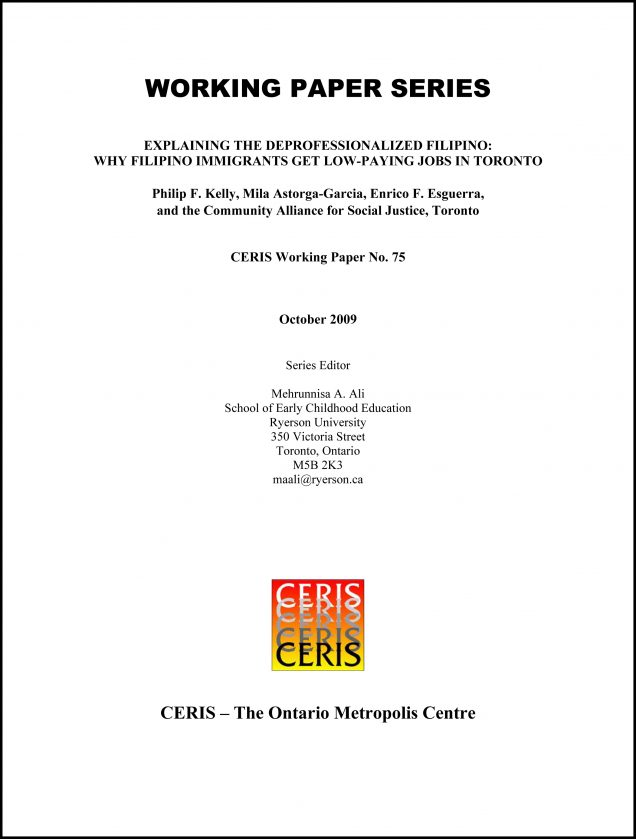Deprofessionalization of Immigrants Solved?
Deprofessionalization of Immigrants Solved?
 By Dr. Philip Kelly
By Dr. Philip Kelly
Professor of Geography, Faculty of Environmental and Urban Change, York University
More than a decade has passed since research by York University and the Community Alliance for Social Justice (CASJ) highlighted the challenges faced by Filipino professionals in the Canadian labour market. What impact did that research have? How have governments responded to the challenges of foreign credential recognition? And, most importantly, have circumstances improved for foreign-trained professionals from the Philippines and elsewhere?
The York/CASJ study was published in 2009 but it was based on a survey and interviews conducted in 2005-07. We found that although Filipino immigrants to Canada (and Toronto in particular) had experiences in common with many other foreign-trained professionals, there were also some specific factors affecting the Filipino community. These included: the role of the Live-In Caregiver Program as a prominent channel for immigration; the distinctive ways in which Filipinos are racialized in Canadian society; and, a widespread ignorance among credentialling authorities about the educational and training system in the Philippines. What has changed since then?
Overall, it is fair to say that the issues of deprofessionalization and foreign credential recognition have been on the radar of all levels of government in Canada. Just as we were conducting the research in 2006, the Office of the Fairness Commissioner was being created in Ontario to impose greater accountability and transparency on the organizations that regulate access to professions and trades. (Other provinces have followed suit with similar agencies in the years since then). The federal government has also been active, with a Foreign Credential Referral Office created in 2007, and a Foreign Credential Recognition Program to provide funding to local regulators and service providers across the country. There is evidence that these provincial and federal programs have moved the needle on transparency, consistency and accountability, but a fair assessment of credentials is still not universal, and there is certainly still a great deal of talent wasted among Canada’s immigrant communities.
Later research in the 2010s suggested that, overall, around 75% of immigrants in Canada work outside the field for which they were trained. The precise figure varies by profession. Lawyers and engineers, for example, are less likely to be matched to a relevant job than pharmacists and nurses. Some studies have attempted to quantify the cost to the Canadian economy of failing to utilize immigrant skills. In 2016, for example, the Conference Board of Canada estimated that C$13-17 billion could be realized through better-employed human capital resulting from enhanced learning recognition.
Immigration policy has also changed. Arrivals through the live-in caregiver program were peaking when the York/CASJ research was conducted, but subsequent changes to the program have included more restrictive educational and language requirements, and an annual quota limit on immigrant numbers. While many activists criticized the caregiver program for the precarious and vulnerable working conditions it created, limiting that immigration pathway was not what most advocates had in mind. However, the legacy of the caregiver program still exists. Between 2014-18, over 100,000 immigrants landed in Canada through the caregiver program as the federal government cleared painfully long application backlogs. Research over the last few years by Dr Ethel Tungohan and others shows that many of those caregivers are still stuck in jobs that don’t reflect their pre-migration skills and credentials.
While the personal and collective economic costs of deprofessionalization have long been recognized, we are also learning more about how the process is navigated in a cultural sense. For many immigrants, especially from a place like the Philippines where identities such as “Engr” or “Atty” are proudly borne, coming to terms with deprofessionalization can be difficult. Nothing less than a renegotiation of one’s identity is required if one is stripped of a professional designation. Research currently underway at York University by Filipino-Canadian doctoral candidate Jeffrey Andrion is illustrating this process of identity renegotiation among foreign trained physiotherapists.
The York/CASJ study contributed to a wider public discourse about immigrant deprofessionalization and foreign credential recognition, but highlighted the group-specific nature of the “immigrant experience”. It would be nice, of course, to think that such studies, and the debates that they create, have made an impact. In building the pressure for policy and institutional changes, undoubtedly such analyses do make a difference. But at the same time, research continues to highlight the mismatches between immigrant employment and the education/skills/credentials that immigrants bring to Canada.
Comments (0)